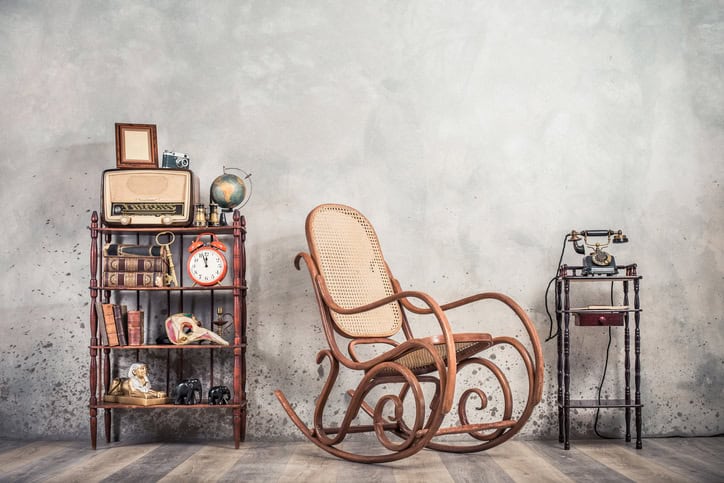
There are lots of organizing myths out there but there are three organizing myths that I always seem to be debunking with my clients so I thought I would review them with you here. All three revolve around a common theme: clutter. Myth number one: your home must be clutter free to be organized. This is absolutely not true. Do you know your home can be cluttered and organized?
What did you think when you read that question? Did you think I had misspoken? Maybe you are questioning my sanity. Whatever you are thinking, it’s true. A home can be cluttered and organized. One of the biggest organizing myths is that your home must be absolutely clutter free to be organized. It’s all in your definition of clutter.
Define cluttered
You may walk into a room and think it is cluttered because it is full of seemingly random stuff. The person who lives there may keep the room this way because to them it feels cozy.
It’s all in how you define cluttered.
This is personal to each and everyone of us. I happen to work best with small stacks of things around me. Papers or articles or books that I may or may not refer to. My friend, Jonda Beattie, likes to have nothing on her desk.
My office looks cluttered to Jonda, but it is truly a very organized space. It is the way I want it. That’s the key here. Each person has the right to have their home the way they want it. The disclaimer is that if more than one person lives in the home it’s important to compromise or maintain a balance to ensure that everyone in the home is comfortable with the level of clutter (or lack thereof) in the home.
Clutter is the result delayed decisions
Another of these organizing myths is that clutter is always the result of delayed decisions.
Sometimes people leave items out to cue them to take action. When no action is taken the item becomes a nagging reminder and then becomes clutter. But not all clutter is the result of a delayed decision.
A person may have lots of memorabilia on a shelf. These things may be visual reminders of wonderful vacations. To you, it may look like clutter. To the homeowner it brings back great memories. Memories they want to revisit time and again.
Since we’ve already determined that being organized is personal, it’s up to the homeowner to decide how many things they want to display. What a cluttered display looks and feels like to them. And to determine when the display becomes over-crowded and confusing. These are things for the homeowner to think about.
A beautiful home is an organized home
A home may be beautifully decorated and finished nicely and yet be very disorganized. Are you wondering how that can be so? Well, just because the colors of the furnishings are coordinated, and the throw pillows artfully placed it is not necessarily an organized home.
This is one of the organizing myths that is perpetuated by home improvement shows and magazines. These shows and magazines feature beautifully decorated homes with nary an item out of place. The containers are matching and perfectly labeled. There is rarely a glass by the sink or a pair of shoes out of place. This is, of course, because the room is staged and not lived in.
It takes more than just the pretty stuff to make a home organized.
Organizing systems
I have been in homes that are surface gorgeous but underneath the surface there are no systems in place to enable the homeowners to be organized. They didn’t know what they had in their homes or where to begin looking for what they wanted to use.
A home is organized when the people who live in the home can easily put their hands on the things that make their lives run smoothly. Also, they know where to return items. Containers don’t have to match, they just have to work for the individual, and corral the intended items.
Professional organizers
Trained professional organizers ask questions to help homeowners define their personal comfort level with clutter. For some, having a multitude of things around makes their home feel cozy to them. For others, it’s important to have surfaces devoid of any excess.
The questions to answer are:
Do you have what you need, love, and use in your home?
Can you easily put your belongings away?
Is it easy for you to find what you are looking for?
These trained professional organizers also develop systems for the homeowners to maintain the organization. The answers to these questions and systems designed specifically with the homeowners in mind are the important ingredients intrinsic to having an organized home.
So, if you’re thinking that your home must be clutter-free home to organize it, that is one of the organizing myths to toss aside. Your home may be as cluttered as works for you and your family.
If you want guidance figuring out the level of clutter that works for you and your family join Jonda and me as we lead the Clear Space for You online clutter support group. There are new groups starting in April.
Diane N. Quintana is a Certified Professional Organizer® ,a Certified Professional Organizer in Chronic Disorganization®, Master Trainer and owner of DNQ Solutions, LLC and co-owner of Release●Repurpose●Reorganize, LLC based in Atlanta, Georgia. She specializes in residential and home-office organizing and in working with people affected by ADD, Hoarding, and chronic disorganization. Diane and Jonda Beattie are the best-selling authors of: Filled Up and Overflowing.


I always love a discussion on myths. The ones you chose are terrific.
There are so many out there. I especially liked what you said about organization is being able to easily put your hands on items that make your life run smoothing. Also, knowing where to return them, so you can find them again.
A constant challenge is living with people who have a different perspective on clutter. I have this discussion with clients all the time and it’s a tough one. I’d really like to hear your thoughts on that.
I LOVE your organizing myths! I’ve thought about them before, but you described and brought them to the top of my mind. I especially appreciate what you wrote because it speaks to the concept that looks can be deceiving. And when you get down to the heart of what clutter and organizing mean to each person (which varies), it frees-up the outcomes. Helping our clients to create a level of organization that works for them is the place to focus. It’s not useful to compare or create an unrealistic scenario or goal.
I love that you state, “it’s all in how you define clutter.” That is so true! Clutter, to me, is not the same as clutter to someone else. Thank you.
[It looks like the comment I made on Sunday didn’t take. Hopefully this won’t be a duplicate.]
I have that rocking chair! I absolutely agree with the myths as you’ve described them. So often, people mistake aesthetics for functionality, and I believe you can look disorganized to an outsider but have functional systems. Like you, Diane, my desk may seem cluttered when I’m in the midst of a project, but it’s all part of a functional system where I can find everything I need within seconds, and it’s logical for me. The three questions you identified really get to the heart of the matter, because if you have everything you need, love, and want, and can easily put it all away and retrieve it, then you’re organized! (And if it looks like a magazine but you can’t find what you need, well, you’re probably not.) Spot on!
Myths busted, Diane! I love how your reminded us that decluttering is always about what works for YOU.
Clutter can definitely be organized – I know this from my own experience!
I love that you and Jonda have different ideas of what an office should look like! We have different tastes and preferences, and you can be organized with a variety of “looks.” Such an excellent point. Organizers aren’t coming in to make every space look the same, but to function well for the client!
Great article! I especially liked the question, “Can you easily put your belongings away?”. if it is difficulty to put items away then they are more likely to be left out on a surface “just for now” and become clutter. It is important to keep it simple.